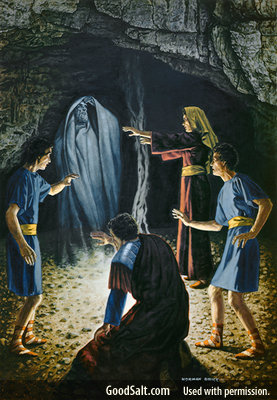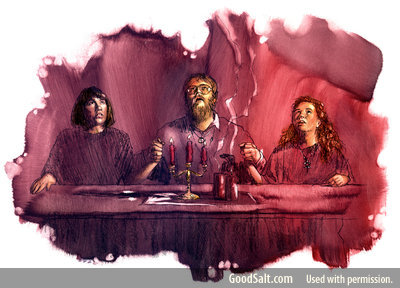(1 Samuel 28:13, 14) Didn’t the Witch of Endor Call Up the Spirit of Samuel?
Posted Feb 20, 2025 by Kevin J. Mullins in Questions Concerning the State of the Dead
 “And the king [Saul] said unto her [witch], Be not afraid: for what sawest thou? And the woman said unto Saul, I saw gods ascending out of the earth. And he said unto her, What form is he of? And she said, An old man cometh up; and he is covered with a mantle. And Saul perceived that it was Samuel, and he stooped with his face to the ground, and bowed himself.” (1 Samuel 28:13, 14)
“And the king [Saul] said unto her [witch], Be not afraid: for what sawest thou? And the woman said unto Saul, I saw gods ascending out of the earth. And he said unto her, What form is he of? And she said, An old man cometh up; and he is covered with a mantle. And Saul perceived that it was Samuel, and he stooped with his face to the ground, and bowed himself.” (1 Samuel 28:13, 14)
There are several points to consider when dealing with this historical story:
1. The first point to make here is that these verses clearly say that king Saul “perceived” that it was Samuel. He was only guessing it was Samuel according to the description the witch gave him. The witch was deceiving Saul. Actually, you could say that Satan and his “spirits of devils” (Revelation 16:13, 14) were deceiving them both.
2. The second point to make is in verse 8 where we read that Saul had to disguise himself before going to see the witch. Why does he disguise himself? Because earlier he himself had banished all “those that had familiar spirits [claimed to be mediums], and the wizards, out of the land” (verse 3). Saul disguised himself because he did not want to be seen going against his own law.
3. The third point to make is the reason why Saul banished all mediums from the land in the first place. The answer is that God Himself had declared: “A man also or woman that hath a familiar spirit, or that is a wizard, shall surely be put to death ...” (Leviticus 20:27). We will not go into detail about why God commanded such a penalty here, but just remember that it is not God’s will that we should seek these kinds of people:
“When thou art come into the land which the LORD thy God giveth thee, thou shalt not learn to do after the abominations of those nations. There shall not be found among you any one that maketh his son or his daughter to pass through the fire, or that useth divination, or an observer of times, or an enchanter, or a witch, Or a charmer, or a consulter with familiar spirits, or a wizard, or a necromancer. For all that do these things are an abomination unto the LORD: and because of these abominations the LORD thy God doth drive them out from before thee. Thou shalt be perfect with the LORD thy God. For these nations, which thou shalt possess, hearkened unto observers of times, and unto diviners: but as for thee, the LORD thy God hath not suffered thee so to do.” (Deuteronomy 18:9-14)
4. The fourth point to make is why would God obey the voice of the witch by letting Saul communicate with the dead if He had previously said this sort of thing is an “abomination”? It is clear that God was not behind this séance!
5. The fifth point to make is the reason why Saul wanted to speak to Samuel. The Philistines were waging war against king Saul, and he wanted some divine counsel on what to do. At this time in Saul’s life, Saul had departed from God and thus cut off any communication between them. God had said, “It repenteth Me [makes Me sorrowful] that I have set up Saul to be king: for he is turned back from following Me, and hath not performed My commandments” (1 Samuel 15:11). Because God would not communicate with him, Saul decided to secretly seek the witch in order for her to call up the spirit of the prophet Samuel to see if he could give him some counsel on what to do. What did the prophet Samuel supposedly tell Saul after he was called up? He said, “Moreover the LORD will also deliver Israel with thee into the hand of the Philistines: and tomorrow shalt thou and thy sons be with me” (1 Samuel 28:19). If the doctrine of the immortal soul is correct, and those who have accepted Jesus go directly to heaven, and the ungodly go directly to a place of burning at death, why would the righteous Samuel tell unrighteous Saul that he would be with him tomorrow when he dies? Those who teach that Samuel’s soul went directly to heaven when he died would have to believe that Saul’s soul would go to heaven when he died.
6. The final point to make is why king Saul did in fact die the next day and the kingdom was given over to David? First, we must remember that even false prophets get things right:
“If there arise among you a prophet, or a dreamer of dreams, and giveth thee a sign or a wonder, And the sign or the wonder come to pass, whereof he spake unto thee, saying, Let us go after other gods, which thou hast not known, and let us serve them; Thou shalt not hearken unto the words of that prophet, or that dreamer of dreams: for the LORD your God proveth you, to know whether ye love the LORD your God with all your heart and with all your soul. Ye shall walk after the LORD your God, and fear Him, and keep His Commandments, and obey His voice, and ye shall serve Him, and cleave unto Him.” - Deuteronomy 13:1-4
So, even if the “prophet” predicts things right, (or, may make it seem the Holy Spirit is at work) if he/she leads you away from God’s Commandments causing you to “go after other gods” then that “prophet” is a “false prophet.” Here in our passage in question we see trickery using a false prophet, namely one of the "demonic spirits that perform signs" to deceive (Revelation 16:14). Even though the prediction came true, the so-called prophet’s soul is condoning Saul’s actions of going against the Command of God not to seek out spirit mediums.
When Saul died, Scripture says:
 “So Saul died for his transgression which he committed against the LORD, even against the word of the LORD, which he kept not, and also for asking counsel of one that had a familiar spirit [a medium], to enquire of it; And enquired not of the LORD: therefore He slew him, and turned the kingdom unto David the son of Jesse” (1 Chronicles 10:13, 14; please see the article entitled, What is God’s Wrath? to learn the meaning of when it says, “God slew him.”)
“So Saul died for his transgression which he committed against the LORD, even against the word of the LORD, which he kept not, and also for asking counsel of one that had a familiar spirit [a medium], to enquire of it; And enquired not of the LORD: therefore He slew him, and turned the kingdom unto David the son of Jesse” (1 Chronicles 10:13, 14; please see the article entitled, What is God’s Wrath? to learn the meaning of when it says, “God slew him.”)
This proves God was not leading king Saul in his quest to communicate with the dead. Scripture clearly says the act of trying to communicate with the dead is a Satanic practice. It shows that a person is not being faithful in keeping God’s word, but is being faithful to Satan’s words, “Ye shall not surely die” (Genesis 3:4).